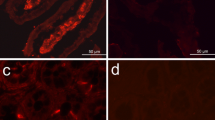Summary.
Hydrogen sulfide is one of three gases involved in biological functions and synthesized in vivo. Like NO and CO, it seems to act as a neuromodulator: it modulates NMDA glutamate receptor function. CBS seems to be the only source of hydrogen sulfide in the brain, whereas the liver synthesizes hydrogen sulfide via cystathionase. In the heart, the third pathway for the hydrogen sulfide synthesis, the 3-mercaptopyruvate pathway is used. Only two diseases characterized by alterations of hydrogen sulfide metabolism have been described: decreased hydrogen sulfide synthesis in the brains of Alzheimer’s disease patients and increased hydrogen sulfide synthesis due to the overexpression of CBS in Down syndrome patients.
Similar content being viewed by others
Author information
Authors and Affiliations
Rights and permissions
About this article
Cite this article
Kamoun, P. Endogenous production of hydrogen sulfide in mammals. Amino Acids 26, 243–254 (2004). https://doi.org/10.1007/s00726-004-0072-x
Received:
Accepted:
Published:
Issue Date:
DOI: https://doi.org/10.1007/s00726-004-0072-x




